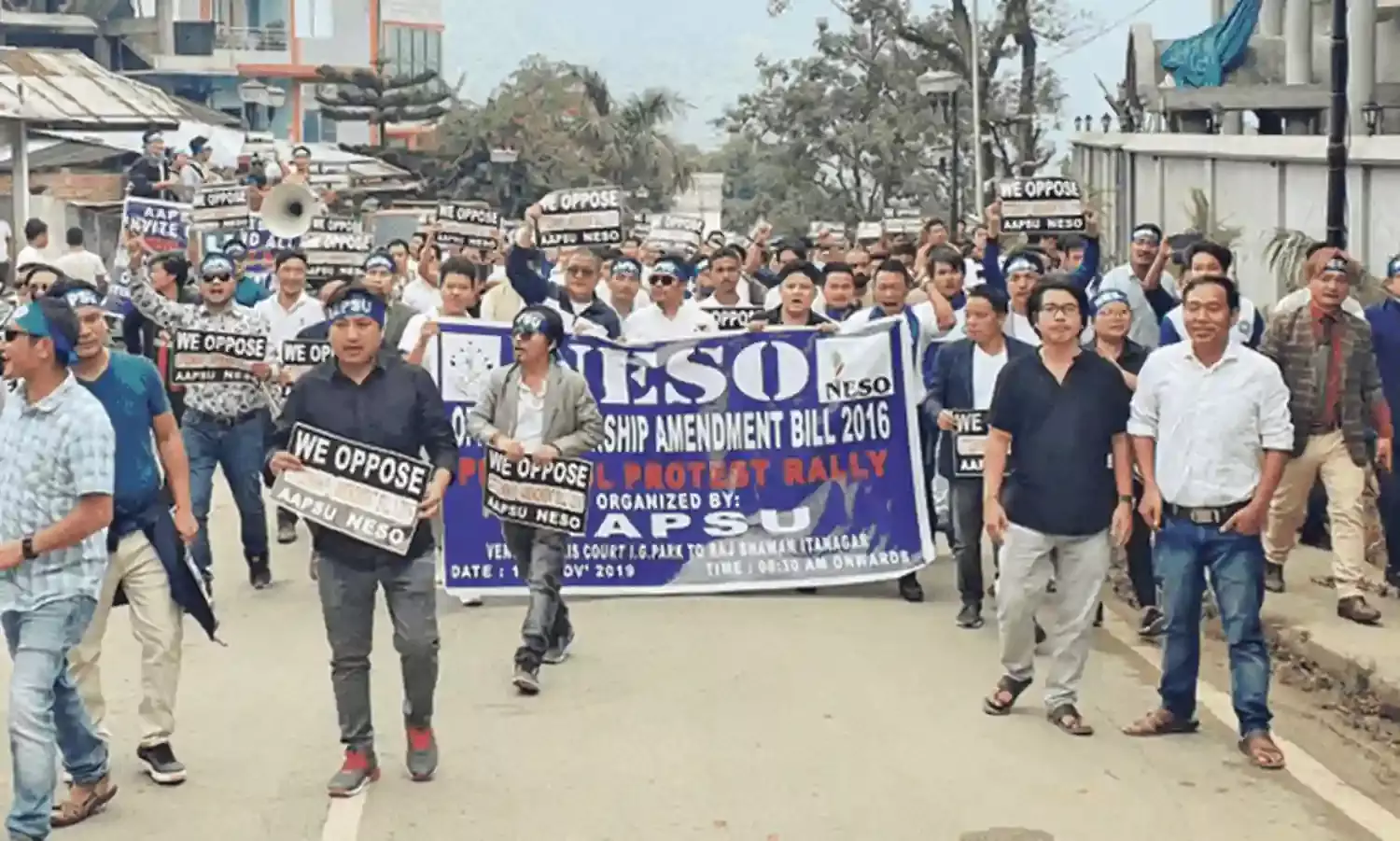Widespread Protests against Citizenship Amendments across the Northeast
Protestors want regionwide constitutional safeguards, Inner Line Permit, NRC;

ITANAGAR: Protestors led by student unions across the Northeast took to the streets to voice their rejection of the central government’s plans to pass the Citizenship Amendment Bill in Parliament’s winter session just begun.
Organised by the North East Students’ Organization (NESO), affiliate bodies held rallies in the capitals of their states.
A statement by NESO submitted to the Raj Bhavans and addressed to Prime Minister Narendra Modi says that “indigenous peoples of the region are vehemently opposed” to the bill.
The bill would amend the Citizenship Act to introduce a criterion of religion, making it easier for people of six non-Muslim faiths from Afghanistan, Bangladesh or Pakistan to gain Indian citizenship.
Protests against the proposed amendment have been most vocal in the northeastern states, where indigenous communities feel it will cause massive demographic change as Bangladeshi citizens begin taking shelter in the country, primarily in the region.
The NESO statement says that the northeastern states “have taken the load of Hindu refugees who have migrated due to the liberation war of Bangladesh in 1971 and [the Citizenship Amendment] Bill is again an attempt to impose the burden of the post-1971 Hindu Bangladeshis in the entire region”.
Before the Lok Sabha elections earlier this year, the BJP said it was committed to enacting the bill which earlier failed to clear the Rajya Sabha. It also said it would “make all efforts to clarify the issues to the sections of the population from the north-eastern states who have expressed apprehensions regarding the legislation”.
Yesterday’s protests not only voiced opposition to the Centre’s plan, but also called for the introduction of an Inner Line Permit in all the states of the region.
Protestors are also demanding that a National Register of Citizens should be created in all the northeastern states, and a constitutional safeguard provided to the people of the region to delegate “vast federal authority including the rights over land and its natural resources.”
When Parliament abrogated erstwhile Jammu and Kashmir’s constitutional safeguards Articles 370 and 35A last August, concerns grew that a similar move was on the cards for the states of the northeast.
The BJP has tried to play down these concerns, with its leaders repeatedly saying that the Northeast will be protected, but fears persist.
Various provisions under Article 371 of the Constitution, the Bengal Eastern Frontier Regulation, and the Sixth Schedule provide for ‘protected status’ to a number of states in the region. These protections relate to land ownership and regulation of entry of other Indian citizens into these defined areas.
Earlier this month, the Meghalaya Democratic Alliance government, which includes the BJP, approved an amendment to the Meghalaya Residents Safety and Security Act of 2016 to make it mandatory for people visiting the state for more than 24 hours to register their entry.
In Arunachal Pradesh the government last month formed a consultative committee to take inputs on the Citizenship Amendment Bill from tribal community-based organisations, civil societies and students’ unions in the state. The committee is being headed by Home Minister Bamang Felix, earlier of the NCP and now with the BJP.
Chief minister Pema Khandu had said earlier that a nine-member committee consisting of MLAs across party lines, the senior additional advocate-general, and two senior bureaucrats would hold public consultations on the bill and submit their recommendations to the Centre, “so as to ensure that adequate provisions are incorporated in the aforesaid bill safeguarding the interests of the people of the state”.
The committee submitted its report to the state cabinet yesterday but the details have not been made public yet. A final consultation meeting will be held “with all stakeholders” on Wednesday before the recommendations are sent to the Union Ministry of Home Affairs.
‘North East remains a distant place for the Union government’
The protests staged across the region yesterday coincided with yesterday’s cabinet meeting. They were spearheaded by NESO, an umbrella organisation comprised of the All Arunachal Pradesh Student’s Union, the All Assam Students’ Union, the All Manipur Students’ Union, the Naga Students’ Federation, the Khasi Students’ Union, the Garo Students’ Union, the Mizo Zirlai Paul, and the Tripura Students’ Federation.
The statement issued by NESO accuses politicians of having supported Bangladeshi immigrants “which threatens the identity of the indigenous peoples of the region”, and says the states “have suffered badly due to the illegal flow of foreigners”.
“We feel that the North East remains a distant place for the Union Government. The Union government does not understand our problems and our aspirations. Our social structure, our history and our cultural values are unknown to the rest of the country.
“The intended Bill is the latest example that the lawmakers of the country have no regard for the future of the indigenous peoples of the region.”

